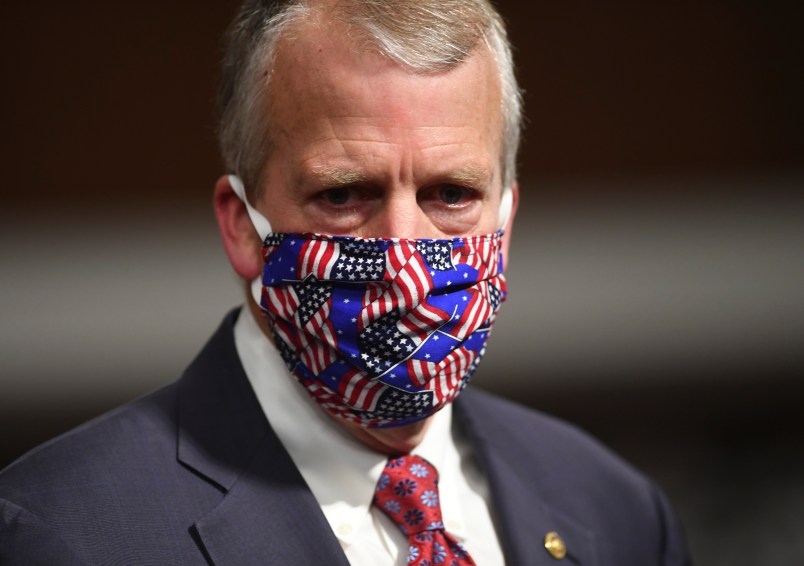Alaska Democrats are sounding the alarm around a last minute change to the state’s 2020 general election ballot that will no longer differentiate independent candidates, calling the quiet move a biased decision that was tacked on just days before ballots are to be mailed to overseas voters.
The change means that candidates will no longer have their party registrations listed on the ballot. Instead the contenders are listed as nominees of a particular party or as having entered a race through the petition process.
The change was made on Monday by Alaska Division of Elections Director Gail Fenumiai and showed up on sample ballots posted on the Alaska Division of Elections website, the Anchorage Daily News reported.
The news comes follows last month’s August 2020 primary in which Alaska’s “nonpartisan” candidates were differentiated with an “N” next to their name.
The adjustment primarily affects independent candidates — namely Al Gross, who is hoping to declare a victory over Sen. Dan Sullivan (R) and Alyse Galvin who is taking on longtime Republican Rep. Don Young.
Both candidates have cited their independent status as critical to their campaign message amid an increasingly polarized election.
By simply glancing at the sample ballot, however, it’s not possible to identify that the two candidates have differentiated themselves as independents or non-partisan. Instead they’re grouped together with registered Democrats who won party primaries and are each labeled as a “Democratic Party Nominee.”
Executive director of the Alaska Democratic Party, Lindsay Kavanaugh told the Daily News that she was “disgusted” by the move, and criticized election officials for a “lack of transparency.”
A campaign spokesperson for Gross’ campaign said state officials should address why the ballot was “arbitrarily” changed.
“The lieutenant governor should tell Alaskans why he arbitrarily changed the ballot from its 2018 format,” Savel told the Daily News, adding that the Gross campaign prefers the 2018 format, but has no intentions of formally challenging the switch.
Matt Shuckerow, who directs Sullivan’s reelection campaign, said Gross was “actively” courting the Alaska Democratic Party to back his campaign and questioned his late game decision to distance himself from the party, saying, “I’m not sure why he doesn’t want (Democratic backing) now.”
Fenumiai did not immediately provide an answer explaining the sudden change, telling the Daily News that she’s been occupied by other concerns.
In 2016, the Alaska Democratic Party sued to overturn a state law that blocked it from allowing independents to run in its primary. That case wasn’t decided until 2018, when the Alaska Supreme Court ruled in favor of the party.
That fall, the state marked candidates both with their registered party and noted which party had backed their nomination.
“Now, they have made a substantive change to Alaskans’ general ballot and failed to notify stakeholders, most notably the voters. That is unconscionable,” Kavanaugh, the head of Alaska Democrats, said. “I am increasingly concerned about the ability of the Lt. Governor to make informed, unbiased, decisions about the election, and of the integrity of those running the DOE. Alaska voters, especially the majority of those voters who are undeclared and non-partisan, need to call bullshit.”
The last-minute change follows a flurry of sudden false starts as states finalize their ballots ahead of what is likely to be a historical vote-by-mail election. Last week, battleground Wisconsin, even stalled ballot mailing — after some absentee ballots had already been mailed out– while the state’s Supreme Court ruled on whether a Green Party candidate should be listed on Wisconsin’s ballot. The court opted against the change, but states like Pennsylvania are experiencing a similar hold-up.







Looks like the independent Dr. Al Gross is an actual legitimate threat to Senator Dan Sullivan (and continued Republican control of the Senate) and needed to be stopped.
Um, what is more pressing than the upcoming election. And if you CHANGED it, how do you not have time to explain that change? Oh, yeah, cuz you’re trying to skew the vote. “We don’ need to protect and deeefend NO steenkeen constitution…”
More Republicans executing the Stalin quote: “It’s not important who votes. It’s only important who COUNTS the votes.”
There is a coordinated campaign by Republicans to sow confusion on the ballots. In Oregon, Republicans have filed a last-minute (actually later than last-minute even) challenge to our current ballots, which have already been printed. There’s a hearing in about half an hour to enjoin our SoS from sending out the ballots because Republicans are trying to get the Libertarian candidates for US Senate off the ballot.
They’ll be doing this in every state. Just watch.
Uno ) Sullivan n Goss are tied (PPP poll)
Dos ) Begich was the last Democrat to win a senate seat (12 years ago, brain freeze)
Tres ) c’mon payday (Goss donation).